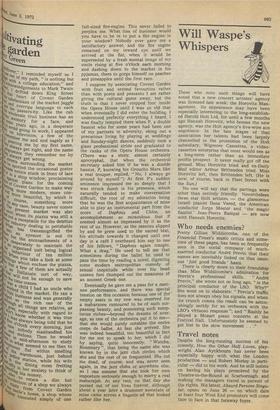i tivating
garden
Green
on'oWer," I reminded myself as I r"e out of my path, "is nothing but 1,.With a college education," and r,-,,c4aoWledgements to Mark Twain drifted down King Street the'4t heart of Covent Garden Itoii-rabelaisians of the market juggle kdatnhci overripe language to each , the , e Passers-by. Like the cab inlynolesale fruit business has an s"‘ Llaernory for a face, and "e years ago, in a desperate 4VO1d going to work, I appeared re,.2a television, a few of the 'leather me and nod sagely as I they greeting me by my first name, Pro, 4„1Ways get right, and the name the '`athine they remember me by stre alwaYs get wrong. be et s surrounding the market Iliad Spotted the occasional poster r e notice stuck in front of lace 1)'apirl a shop window, proclaiming %c'64inst plans for the coming ethihf Covent Garden to make way more modern, more conof "ore beautiful, by which is e Course, something more Ti;„allY case, beauty never comes I on' Present market was also theChee, When its piazza was still a Ce a receptacle for the detritus 4'adUstry dealing in perishable illtot has transmogrified the JIre k an eyesore is not its %1 unt the encroachments of a Of4hdesPerately to maintain the the kc'rganised unit being logical kts, wrhaviour of ten million uten You take a look at some ice th'igs which enclose the piazza, ‘at a few of them are actually tha't4 Italianate sort of way, th Will not be enough to save e tittle coes.
i
0 V 0 if $t
Ii' lit rit
ijiltre i$0 m of 1„01, a child I had an uncle who .,1, i *let T:1 in the market. He ran a 'Nett business and was generally Is•4Ithen Las the rich one of the I ki6-„,g" all things are relative, as • ticF,'s, especially with regard to 11,-141,,vt,kn.°w whether it was true $. f % ''s always being told that he o'clock every morning, just h alide nobody manhandled his 014 iri melons Then he would toll, e . • 6, _, Mid-afternoon to study "4-1Dwnat seemed to me then to tf ,,c)as flat within smelling 4t h"'s warehouse, just behind lit 1:lice station, while his wife I141f,aill the dining room fretting [1 tIlDelitilYtIgrrih.her anxiety to think or . il)t also Is money. 1 reQrs, to retain a dim but 1 tet4 r'01„le,e,stion of a shop we always „all, " from Covent Garden "itial"acie's home, a shop whose Consisted simply of one full-sized fire-engine. This never failed to perplex me. What line of business would you have to be in to put a fire engine in your window? Nobody ever gave me a satisfactory answer, and the fire engine remained on my inward eye until we arrived at the flat, when it would be superseded by a fresh mental image of my uncle rising at five o'clock each morning and dashing down to the market in his pyjamas, there to gorge himself on peaches and pineapples until the first race.
I suppose by associating Covent Garden with fruit and second favourites rather than with poets and peasants I am rather giving the cultural game away, but the truth is that I never stepped foot inside the Opera House until I was so old that when eventually I did enter the building, I understood perfectly everything I heard. I was finally tempted there when P, a double bassist who for some years had been one of my partners in adversity, eking out a precarious living by playing at weddings and Sunday-night dances, suddenly took a giant professional stride and graduated to the ranks of the Opera House orchestra. (There was a story, almost certainly apocryphal, that when the orchestral secretary asked him if he was a double bassist, P, knowing his Groucho Marx like a real trouper, replied, "No, I always go around by myself.") At first P's sudden eminence impressed me so deeply that I was struck dumb in his presence, which naturally tended to make conversation difficult, the root of my adoration being that he was the first acquaintance of mine able to play an instrumental part from the score of Daphnis and Chloe, an accomplishment so miraculous that P seemed almost as impressed by it as the rest of us. However, as the seasons slipped by and he grew used to the sacred text, his attitude towards it changed until one day in a cafe I overheard him say to one of his fellows, "Daphnis again tonight. What a drag." He used to tell me that sometimes during the ballet he used to pass the time by reading a novel, digesting some modern metropolitan comedy of sexual ineptitude while over his head unseen feet thumped out the measures of an ancient Greek one.
Eventually he gave me a pass for a matinee performance, and there was special tension on this occasion because one of the empty seats in my row was reserved for a maharanee rumoured to be of such surpassing beauty, and possessing such sumptuous riches—beyond the dreams of average, as one of the orchestra put it to me— that she would surely outshine the entire corps de ballet. At last she arrived. She was indeed beautiful, too beautiful in fact for me not to speak to her, which I did by saying, quite innocently, " Watcha, Rosemary ", that being the name she was known by in the jazz club circles which she and the rest of us frequented. She cut me dead, of course, and was never seen again, in the jazz clubs or anywhere else, so I can assume that she took her own imposture seriously enough to marry a real maharajah. At any rate, on that day she passed out of our lives forever, although about a year later a drummer associate of mine came across a lingerie ad that looked rather like her.












































 Previous page
Previous page